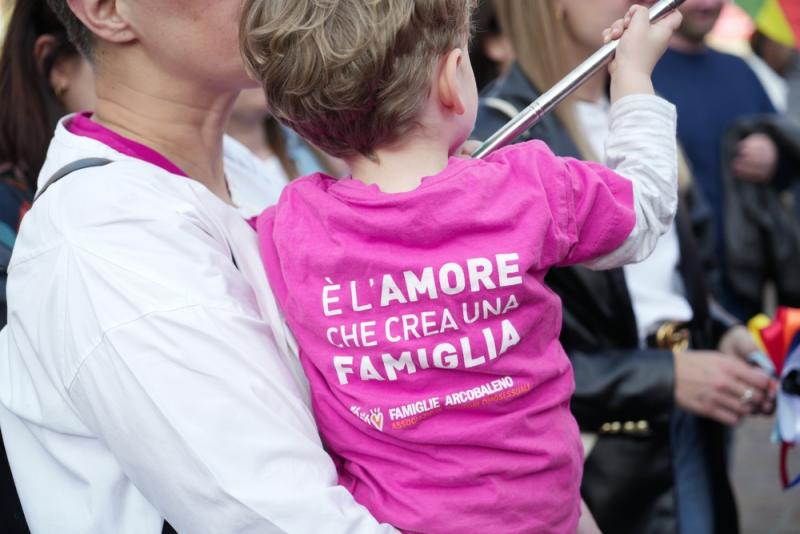The push to criminalize surrogacy for Italian citizens who seek it abroad has been front and center since July 2023 when Prime Minister Giorgia Meloni’s Fratelli d’Italia (Brothers of Italy) party put forth a bill that would make it a universal crime — a category that also includes torture, genocide and slavery. Italy’s parliament passed the bill into law last week with a vote of 84 to 58.
While the ruling far-right party is celebrating a big victory, opponents argue that the legislation disproportionately targets the LGBTQ+ community and insults women with fertility struggles.
Under the new law, any Italian citizen who seeks surrogacy abroad could be punished with up to €1 million in fines and up to two years of imprisonment. (The ban doesn’t apply to foreigners living in Italy, and states that those who have had children through surrogacy abroad in the past will not be affected.)
Meloni — who takes hardline stances centering what she considers to be traditional family values — commended the decision on X (formerly Twitter), calling it “a common sense rule against the commodification of the female body and children. Human life has no price and is not a commodity.”
Similar language has been invoked by the Vatican, which reaffirmed its opposition to surrogacy in a statement circulated in April of this year.
With attitudes like these shaping Italian policy and popular opinion in recent years, many Italians who sought surrogacy abroad — the majority of whom are actually heterosexual couples — chose to keep their path to parenthood a secret for fear of retaliation.
But is the Italian surrogacy situation unique?
No and yes. The Charter of Fundamental Rights of the European Union prohibits commercial surrogacy in EU member states, but the practice commonly known as “altruistic” surrogacy — in which the surrogate mother receives no money beyond reasonable expense reimbursement — is allowed in countries including Denmark, Belgium, the Netherlands and Greece (though in the latter, one of the intended parents must be a woman). But many EU states, including Spain, Germany and France, outlaw altruistic surrogacy, too, just as Italy does.
The controversy in Italy and concerns abroad stem from the far-reaching nature of the expanded Italian legislation, the harsh punishments for violating it, and the perception that it specifically targets LGBTQ+ individuals and families — particularly since the bill’s timing coincided with a 2023 Meloni government edict that prohibited mayors from registering same-sex parents on birth certificates. (Unlike in Spain, Germany and France, same-sex couples do not have access to joint adoption in Italy, so this latest measure effectively leaves gay Italian men with no legal route to having children.)
What’s the history of surrogacy in Italy?
While the expanded legislation is new, the groundwork for it isn’t. Before 2004, medically assisted reproduction was unregulated in Italy, and the idea of introducing more legal intervention into the process was a contested one. Initial efforts sought to quell the “commercial environment” surrounding minimally supervised surrogacy and deal with long court cases on complex paternity issues that had differing outcomes.
In February 2004, the government introduced a law on medically assisted reproduction that included not just surrogacy but also in vitro fertilization and other methods. Surrogacy was first banned under this original law.
A number of challenges to the law followed, which led to aspects of it being dismantled over the years. In 2009, the limit on embryos (three in the original law) was deemed unconstitutional. Then in 2014, the constitutional court rolled back the ban on sperm and egg donations in assisted fertilization. In 2015, the law was once again changed to allow fertile individuals with genetic diseases to access assisted reproduction.
These were big wins for the reproductive rights of people facing infertility or sterility — but many groups of people remained without access, namely same-sex couples, single women and older women.
A closed loophole
Although surrogacy remained banned in Italy, there was a loophole available to those who could afford it: Flying to countries where it was permitted, like Canada (which allows altruistic surrogacy) and the United States (which allows both altruistic and commercial forms of surrogacy).
Still, in 2017, Italy’s constitutional court further entrenched the illegality of surrogacy when it delivered a ruling against a couple who had given birth to a child via surrogacy in another country, stating that the dignity of surrogate mothers and human relations came before the couple’s right to health and self-determination.
Surrogacy abroad remained a legal gray area, and many who traveled to start a family through surrogacy had to lie on Italian birth documents. In 2019, another blow came when the court upheld a prohibition of the recognition of parental orders from other countries for children born via surrogacy.
Finally, the recent judgment has buried any hope for Italian citizens who can’t have children to access surrogacy, since it has been deemed a universal crime with possible prison time and exorbitant fines.
Will Italy still push for babies?
Critics have been quick to point out that the expanded law is counterproductive to current efforts to improve Italy’s declining birth rate. Meloni and her allies continue to urge Italians to have babies, offering social security contributions to women who have at least two children.
But in addition to the surrogacy ban, the ruling far-right party has marginalized groups that could help improve the birth rate, such as immigrants and the LGBTQ+ community. Opponents also say that the financial incentives for families to have children are insufficient given current costs of living.
Other critics have pointed to what they call Meloni’s hypocrisy in inviting Elon Musk, who has had several children via surrogacy, to speak at a December 2023 convention specifically encouraging Italian procreation.









